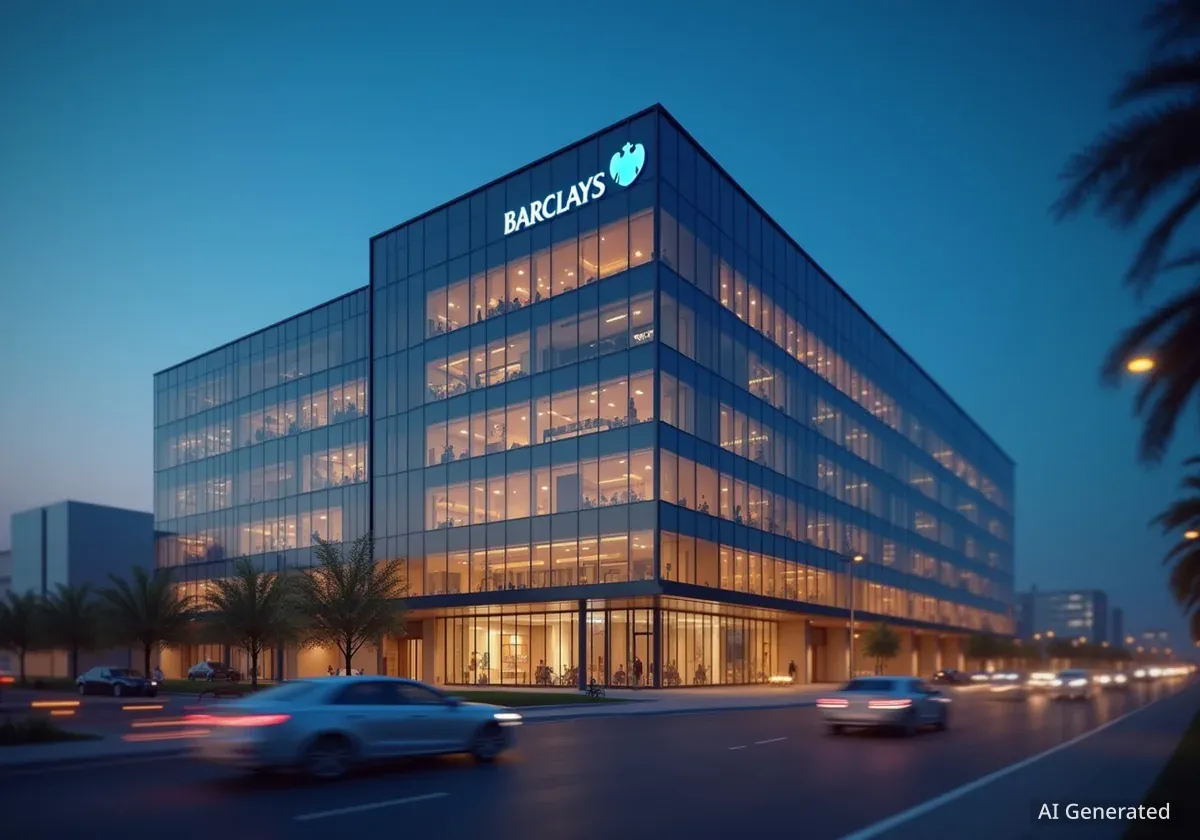Barclays Plc is preparing to re-establish its presence in Saudi Arabia, more than a decade after withdrawing from the country. The London-based financial institution is currently in the process of obtaining a license to conduct investment banking activities, with plans to open a new office in Riyadh next year.
This strategic move positions Barclays among a growing number of global banks expanding their operations in the kingdom, drawn by its ambitious economic diversification agenda.
Key Takeaways
- Barclays is seeking an investment banking license to operate in Saudi Arabia.
- The bank plans to open a physical office in the capital, Riyadh, in the coming year.
- This decision marks a return to the Saudi market for Barclays after an 11-year hiatus.
- The move aligns with a broader trend of international financial firms increasing their presence in the kingdom.
A Strategic Re-entry into a Transforming Market
Barclays' plan to return to Saudi Arabia signals a significant shift in its Middle East strategy. The bank is actively working to secure the necessary regulatory approvals for an investment banking license, a crucial step for participating in the country's burgeoning financial landscape.
The establishment of a new office in Riyadh is a cornerstone of this initiative. This physical presence will allow the bank to directly engage with local clients, manage deals, and tap into the flow of capital being deployed across various sectors. The focus on investment banking suggests Barclays aims to play a role in major transactions, including mergers, acquisitions, and capital raising for large-scale projects.
An 11-Year Gap
Barclays' previous exit from Saudi Arabia occurred over a decade ago, a period when many international banks were reassessing their global footprint in the aftermath of the 2008 financial crisis. The decision to return now reflects a renewed confidence in the kingdom's economic trajectory and regulatory environment.
The Pull of Economic Diversification
The primary driver behind this renewed interest from global finance is Saudi Arabia's comprehensive economic reform plan. The kingdom is undertaking a multi-trillion-dollar effort to diversify its economy away from its historical reliance on oil revenue. This initiative has unlocked a wave of opportunities for international banks.
Key components of this transformation include:
- Mega-Projects: The development of futuristic cities and large-scale infrastructure projects requires substantial international financing and advisory services.
- Privatization: The government is selling stakes in major state-owned enterprises, creating a need for investment banking expertise in public offerings and private placements.
- Foreign Investment: Saudi Arabia is actively encouraging foreign direct investment, making it an attractive hub for multinational corporations and the banks that service them.
A Competitive Landscape
Barclays is not alone in recognizing this opportunity. Numerous other international banks have either established or expanded their operations in Riyadh in recent years. This influx has created a highly competitive environment where institutions vie for roles in landmark deals and advisory mandates.
By re-entering the market, Barclays aims to leverage its global network and expertise to compete for a share of this growing pie. The bank will be looking to capitalize on its brand recognition and established track record in global investment banking.
A Hub for Regional Finance
Riyadh is rapidly positioning itself as a leading financial center in the Middle East. The government's Regional Headquarters Program has incentivized dozens of multinational companies to establish their regional bases in the city, further concentrating economic activity and creating demand for sophisticated financial services.
Navigating the Path Forward
While the opportunity is significant, the process of re-entry requires careful navigation. Securing a license from the Saudi Arabian authorities is a detailed process that involves demonstrating a commitment to the local market and adherence to strict regulatory standards.
Once operational, the Riyadh office will need to build out its team, likely combining international talent with local expertise to effectively understand and serve the market. The success of this venture will depend on Barclays' ability to integrate into the local business ecosystem and differentiate itself from the established competition.
"The return of a major player like Barclays underscores the magnetic pull of Saudi Arabia's economic transformation. It's a clear vote of confidence in the kingdom's long-term growth prospects and its increasing integration into the global financial system."
The move is also indicative of a broader trend where financial institutions are re-evaluating their emerging market strategies. As growth slows in some traditional markets, the high-growth potential of economies like Saudi Arabia becomes increasingly compelling.
For the Saudi market, the arrival of another top-tier global bank increases competition, which can lead to more innovative financial products and better terms for local companies seeking capital. It reinforces the kingdom's status as a critical destination for international finance and a key player in the global economy.





